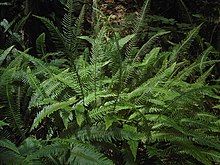Struthiopteris spicant, syn. Blechnum spicant, is a species of fern in the family Blechnaceae, known by the common names hard-fern[3] or deer fern. It is native to Europe, western Asia, northern Africa, and western North America.[1][4] Like some other species in the family Blechnaceae, it has two types of leaves. The sterile leaves have flat, wavy-margined leaflets 5 to 8 millimeters wide, while the fertile leaves have much narrower leaflets, each with two thick rows of sori on the underside.[5]
| Struthiopteris spicant | |
|---|---|

| |
| Scientific classification | |
| Kingdom: | Plantae |
| Clade: | Tracheophytes |
| Division: | Polypodiophyta |
| Class: | Polypodiopsida |
| Order: | Polypodiales |
| Suborder: | Aspleniineae |
| Family: | Blechnaceae |
| Genus: | Struthiopteris |
| Species: | S. spicant
|
| Binomial name | |
| Struthiopteris spicant (L.) F.W.Weiss
| |
| Synonyms[1][2] | |
|
Synonyms
| |
The Latin specific epithet spicant is of uncertain origin, possibly referring to a tufted or spiky habit.[6]
S. spicant is hardy down to −20 °C (−4 °F) and evergreen, growing to 0.5 m (1 ft 8 in).[7] It has gained the Royal Horticultural Society's Award of Garden Merit.[8]
The species was first described in 1753 by Carl Linnaeus as Osmunda spicant. It has been placed in a wide range of genera, including Blechnum (as Blechnum spicant).[1] In the Pteridophyte Phylogeny Group classification of 2016 (PPG I), it is placed in the genus Struthiopteris, in the subfamily Blechnoideae.[9]
-
A sterile leaf
-
A fertile leaf with sori
References
edit- ^ a b c "Blechnum spicant (L.) Roth". Plants of the World Online. Royal Botanic Gardens, Kew. Retrieved 2019-08-12.
- ^ Gasper, André Luís De; Dittrich, Vinícius Antonio De Oliveira; Smith, Alan Reid & Salino, Alexandre (2016-09-21). "A classification for Blechnaceae (Polypodiales: Polypodiopsida): New genera, resurrected names, and combinations". Phytotaxa. 275 (3): 191–227. doi:10.11646/phytotaxa.275.3.1. ISSN 1179-3163. Retrieved 2019-08-11.
- ^ BSBI List 2007 (xls). Botanical Society of Britain and Ireland. Archived from the original (xls) on 2015-06-26. Retrieved 2014-10-17.
- ^ USDA Plants Profile
- ^ Jepson Manual Treatment
- ^ Harrison, Lorraine (2012). RHS Latin for Gardeners. United Kingdom: Mitchell Beazley. ISBN 978-1845337315.
- ^ RHS A-Z encyclopedia of garden plants. United Kingdom: Dorling Kindersley. 2008. p. 1136. ISBN 978-1405332965.
- ^ "RHS Plant Selector - Blechnum spicant". Retrieved 15 April 2020.
- ^ PPG I (2016). "A community-derived classification for extant lycophytes and ferns". Journal of Systematics and Evolution. 54 (6): 563–603. doi:10.1111/jse.12229. S2CID 39980610.
External links
edit- Video footage of Struthiopteris spicant



